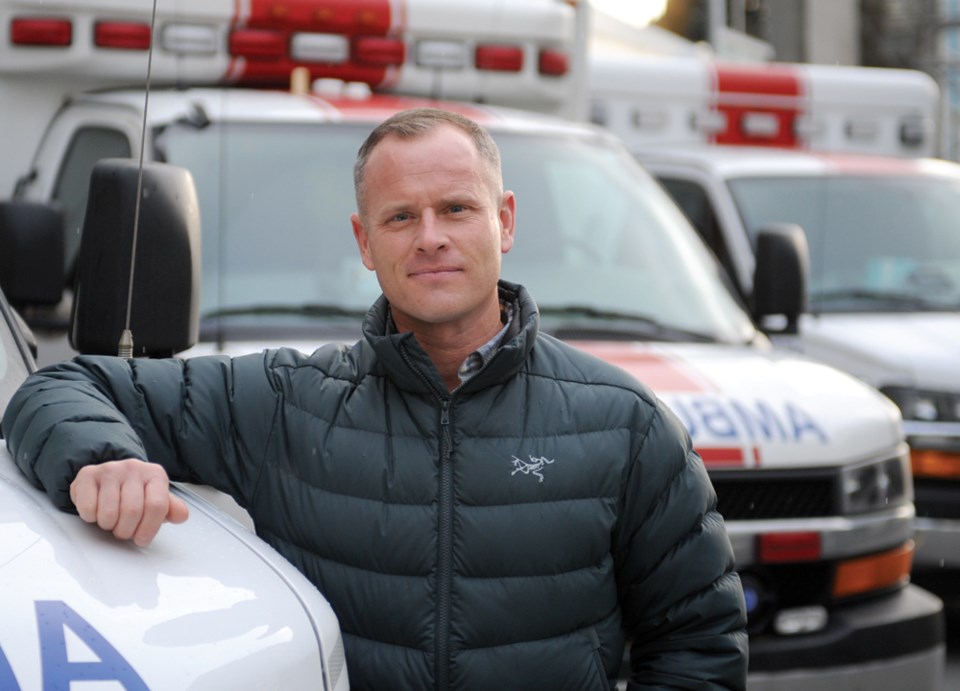North Vancouver’s Jeff Smith understands first-hand the strains that exhausted health care workers and first responders are under.
Starting in 2000, Smith worked for almost 20 years as an ambulance paramedic all over the Lower Mainland.
Working as a paramedic was a natural fit for Smith.
"I come from a family of first responders," he said. "My brother is a firefighter. My mom was a nurse."
He enjoyed solving medical problems and admits he was “a bit of an adrenaline junkie." Smith's passion for the profession also led him to work as an instructor at the Justice Institute and field trainer for new paramedics.
But under the surface, things weren’t going well.
In the last few years of his career, Smith worked on the Downtown Eastside, at a time when B.C. was already in the grip of its first health pandemic – the drug overdose crisis.
His hardest call had come earlier, however, in 2009, when he attended a horrific traffic accident involving a two-year-old child who died after being struck by a tow truck.
At the time “my kids were the same age,” said Smith.
He began having nightmares and flashbacks, unable to get the searing visions of what he’d seen out of his head.
“I struggled,” he said. “I ended up getting lost in alcohol. It kind of consumed my days off.”
With help, Smith got sober, but his problems didn’t end there.
His nightmares continued, and he found himself not sleeping for days at a time, afraid of what he’d see if he closed his eyes.
Conventional psychological techniques – many of which involved reliving traumatic incidents in order to desensitize him – didn’t help much, said Smith.
In February of 2021, he hit rock bottom when he parked his car near Lions Gate Bridge and decided to take his own life.
The irony wasn't lost on him. As a paramedic, being called to help with people who were suicidal was something Smith had done countless times.
"I'd been on the bridge with people who were in those moments, and I don't think I ever really understood – until I was there," he said.
This time, he was the person needing help.
Fortunately, he said, that evening help came in the form of another first responder, a Vancouver Police Department officer, who took him to St. Paul’s Hospital.
After he was released from hospital, Smith said he realized something needed to change. Through his sister, he made a connection with a therapist, Steve King, who had developed a technique for helping with post-traumatic stress. Unlike some of the other techniques he'd tried, this time he didn't have to talk about the incidents that haunted him or go to an office. He'd finally found something that could help him, he said.
It was a turning point, said Smith. Since then, he’s joined forces with King and other first responders in a non-profit group to advocate for help for those suffering from PTSD. The group has created a website which also aims to give people practical techniques they can practice at home.
"There are some significant delays in accessing health out there. And people are apprehensive," said Smith. "This is something that can be done on your own, anyplace, anytime. I think it's important that we give these first responders a skill set they can use in their daily lives."
Smith said one of the first issues he had to deal with as a paramedic was a stigma in admitting that he needed help.
“It still exists today,” he said. “If you put your hand up and say 'That really affected me,' do people start questioning whether you’re able to do the job?”
As a first responder, "you're trained to put those emotions aside to do the jobs you need to, and the problem with that is, when do you address those emotions?" he said.
Today’s COVID-19 pandemic combined with the overdose crisis and events like the summer’s heat dome have pushed many of those on the front lines past their ability to cope, he said.
“I know guys are burnt out. They’re at their limits. These people are tired. They are exhausted.”
Bob Parkinson, health and wellness director for the Ambulance Paramedics of British Columbia union, agrees.
“People are being put under enormous strain and exposure to stress and trauma,” he said. Chronic low staffing levels have taken a toll on those remaining – a situation that became shockingly apparent during the heat dome this summer, when ambulances could not keep up with the volume of calls in the Lower Mainland. “Sooner or later you just can’t keep doing that.”
Occupational stress injuries currently make up the largest type of on-the-job injuries for paramedics, said Parkinson, adding paramedics make up one of the occupations with the fastest-rising injury rates with Workers Compensation.
Parkinson said while the situation is slowly improving, there’s still not enough help, particularly in terms of benefits paramedics can access for psychological help, before situations reach a crisis.
Those kinds of supports are essential if the BC Ambulance Service hopes to retain paramedics, said Parkinson.
“We’re getting better,” he said. “But it’s still nowhere near where we need to be.”




